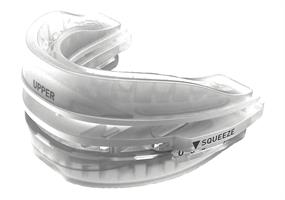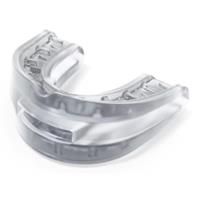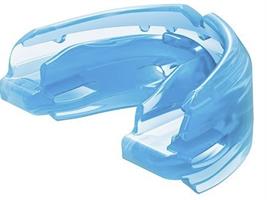Snoring can be a significant disturbance to both the snorer and their loved ones, affecting sleep quality and overall well-being. While there are many potential solutions available, one often overlooked option is the use of mouthguards.
In this comprehensive guide, we’ll explore the history of mouthguards, their role in reducing snoring, and the different types available today. Get ready to discover how mouthguards help with snoring and can assist you and your partner in achieving a better night’s sleep!
Key Takeaways
-
Mouthguards can help reduce snoring through the use of Mandibular Advancement Devices (MADs) and Tongue-Retaining Devices (TRDs).
-
Boil-and-bite and professionally fitted mouthguards offer different benefits, while proper storage, cleaning techniques, and regular replacement are essential for optimal effectiveness.
-
Sleep position adjustments, weight loss/exercise programs, medical treatments/devices may also be used to address snoring problems.
Understanding Snoring and the Role of Mouthguards
Snoring occurs when the flow of air through the mouth and nose is partially blocked during sleep, causing the surrounding tissues in the throat to vibrate and produce the familiar snoring sound. Snoring can be more than just an annoyance; it may also be a symptom of sleep apnea, a sleep disorder characterized by pauses in breathing or shallow breaths during sleep. One effective way to treat snoring and improve sleep quality is by using a mouthguard, an anti-snoring device that helps maintain an open airway during sleep.
There are two primary types of anti-snoring mouthguards: Mandibular Advancement Devices (MADs) and Tongue-Retaining Devices (TRDs). These mouthguards work by repositioning the jaw or tongue, preventing the airway from becoming obstructed and reducing snoring episodes.
We will now delve deeper into the causes of snoring, the efficacy of mouthguards, and explore the different types and customization options available.
Causes of Snoring
Several factors can contribute to snoring, including:
-
The anatomy of the mouth and sinuses
-
Age
-
Obesity
-
Alcohol consumption
-
Use of sedative medications
-
Chronic nasal congestion
-
Weakened muscle tone in the throat and tongue
-
The presence of dental implants
Grasping the underlying causes of snoring aids in determining the most effective solution for each individual.
While some factors may be beyond our control, such as age and anatomy, addressing other aspects like obesity, alcohol consumption, and sleep position can significantly help reduce snoring. Along with these lifestyle adjustments, incorporating an anti-snoring device like a mouthguard can further alleviate snoring and improve overall sleep quality.
How Mouthguards Help

Mouthguards help reduce snoring by maintaining an open airway during sleep, ensuring that the tongue and soft tissues in the throat do not obstruct the flow of air. Devices like the SnoreRx Plus and SleepTight Mouthpiece, which are custom fitted mouthguards, provide a more tailored fit and improved comfort for the user, resulting in a more effective solution for snoring.
The effectiveness of a mouthguard in reducing snoring depends on the type and fit of the device. There are two main types of mouthguards: Mandibular Advancement Devices (MADs) and Tongue-Retaining Devices (TRDs). The following section will provide a detailed examination of these two types, highlighting their unique features, benefits, and drawbacks.
Types of Anti-Snoring Mouthguards
As mentioned earlier, there are two primary types of anti-snoring mouthguards: Mandibular Advancement Devices (MADs) and Tongue-Retaining Devices (TRDs). While both types are designed to help treat snoring, they work through different mechanisms and may be more suitable for different individuals based on their unique needs and preferences.
We will now examine each type in detail, discussing their respective benefits and drawbacks.
Mandibular Advancement Devices (MADs)

Mandibular Advancement Devices (MADs), also known as mandibular advancement device, work by advancing the lower jaw forward, preventing the airway from collapsing and reducing snoring. MADs are highly effective and allow sleepers to breathe through their mouths, making them compatible with any sleep position. However, MADs are also associated with potential risks such as:
-
temporomandibular joint (TMJ) disorder
-
jaw pain and stiffness
-
drooling
-
other side effects
Additionally, they may not be suitable for individuals with braces or dentures, especially those covering upper and lower teeth, and a prescription is typically required.
Despite potential drawbacks, MADs remain a popular choice for those seeking relief from snoring. Their effectiveness in maintaining an open airway during sleep makes them a worthwhile option for many individuals, particularly when used in conjunction with lifestyle changes and other snoring solutions.
Tongue-Retaining Devices (TRDs)
Tongue-Retaining Devices (TRDs) function differently from MADs, focusing on securing the tongue rather than advancing the lower jaw. TRDs use suction forces to move the tongue forward, preventing it from blocking the airway and facilitating easier respiration during sleep.
Some advantages of TRDs include:
-
They are generally lighter and more comfortable than MADs
-
They have fewer side effects
-
They are compatible with dentures and braces
-
They usually do not require a prescription
However, TRDs also have their drawbacks. They are typically not customizable and feature a “one-size-fits-all” design, which may not be suitable for all sleepers. They can restrict breathing by making a tight seal around the mouth. This can be potentially dangerous..
Nonetheless, for those who find MADs uncomfortable or unsuitable, TRDs can be a viable alternative in addressing snoring issues.
Customization Options: Boil-and-Bite vs. Professionally Fitted
In addition to the different types of mouthguards, there are also various customization options available. These include boil-and-bite and professionally fitted mouthguards. While each option offers its unique benefits and drawbacks, finding the right fit is crucial for the effectiveness and comfort of the device.
We will now compare these two customization options, discussing their respective advantages and disadvantages.
Boil-and-Bite Mouthguards
Boil-and-bite mouthguards are a more affordable option compared to professionally fitted devices. These mouthguards are made from a thermoplastic material that can be softened using hot water and then molded to the user’s teeth by biting down, allowing for a more customized fit. They are a popular choice for those seeking a budget-friendly solution for snoring issues.
However, boil-and-bite mouthguards may not provide the best fit and comfort compared to professionally fitted options. This can potentially impact the effectiveness of the device in reducing snoring. When considering a boil-and-bite mouthguard, weighing the cost savings against the potential drawbacks is valuable.
Professionally Fitted Mouthguards
Professionally fitted mouthguards, on the other hand, offer a more precise fit, better comfort, and improved effectiveness in reducing snoring and teeth grinding. These custom-made devices, also known as night guards or mouth guard, are tailored to the individual’s unique dental structure, providing a snug and comfortable fit that is less likely to be dislodged during sleep. They are the ideal choice for people who grind their teeth, snore, or have sleep apnea, and many dental insurance plans may cover some or all of the cost.
The primary drawback of professionally fitted mouthguards is the cost, as they tend to be more expensive than over-the-counter options. However, the benefits of a custom fit and improved comfort may outweigh the cost for many individuals seeking relief from snoring.
Caring for Your Anti-Snoring Mouthguard
Proper care and maintenance of your anti-snoring mouthguard are essential to ensure its longevity and effectiveness in reducing snoring. This includes regular cleaning, proper storage, and timely replacement of the device.
We will now share some tips and best practices for maintaining your mouthguard in top condition and maximizing the return on your investment.
Cleaning Techniques
Regular cleaning of your mouthguard is crucial to prevent bacterial buildup and maintain good oral hygiene. It is recommended to sterilize the device with hot water after each use and clean it regularly with a toothbrush and toothpaste to keep it free from debris and harmful bacteria.
Other cleaning methods, such as using gels, cleaning brushes, and dissolving tablets, can also be effective in keeping your mouthguard clean and hygienic. By incorporating these cleaning techniques into your daily routine, you can ensure your mouthguard remains in optimal condition and continues to provide effective snoring relief.
Storage and Replacement
Proper storage of your mouthguard is essential to maintaining its effectiveness and longevity. When not in use, store the device in its storage case and ensure it is completely dry before storing to prevent the growth of bacteria. Keeping your mouthguard clean and well-stored will help prolong its lifespan and ensure it continues to provide snoring relief.
Replacing your mouthguard is also important, as over time, wear and tear can reduce its effectiveness in preventing snoring. It is recommended to replace your mouthguard every 6-12 months or as advised by your dentist. Regular dental check-ups can also help ensure your mouthguard is functioning optimally and providing the snoring relief you need.
Additional Snoring Solutions and Lifestyle Changes
While mouthguards can be an effective solution for many individuals experiencing snoring issues, it’s important to consider additional snoring solutions and lifestyle changes that can further improve sleep quality and reduce snoring episodes, such as using a night guard.
We will now discuss sleep position adjustments, weight loss and exercise, and medical treatments and devices that can augment the effectiveness of a mouthguard in addressing snoring problems.
Sleep Position Adjustments
Adjusting your sleep position can have a significant impact on reducing snoring. Sleeping on your side, for example, can help prevent the base of the tongue and soft palate from collapsing and obstructing the airway during sleep. This simple adjustment can make a noticeable difference in snoring severity for many individuals.
If you find it challenging to maintain a side-sleeping position throughout the night, consider using a body pillow or other supportive pillows to help keep your body aligned and comfortable. By making these sleep position adjustments, you can further enhance the effectiveness of your mouthguard in reducing snoring and improving sleep quality, so you won’t have to lose sleep over it.
Weight Loss and Exercise
Losing weight and engaging in regular exercise can not only improve your overall health but also help reduce snoring caused by obesity. Excess weight, particularly around the neck and throat, can put pressure on the airway and make snoring more likely. By shedding excess pounds and maintaining a healthy weight, you can alleviate this pressure and reduce snoring episodes.
In addition to weight loss, exercise can help strengthen the muscles in your mouth and throat, which can further help reduce snoring. Incorporating activities like playing sports, walking, or swimming into your daily routine can contribute to better overall health and less snoring at night.
Medical Treatments and Devices
For more severe cases of snoring and sleep apnea, medical treatments and devices may be necessary to provide relief. These can include Continuous Positive Airway Pressure (CPAP) machines, oral appliances, and hypoglossal nerve stimulation.
While these treatments may not be suitable for everyone, they can be highly effective in addressing more severe snoring issues and sleep apnea.
In some cases, surgical procedures such as uvulopalatopharyngoplasty, radiofrequency tissue ablation, and maxillomandibular advancement surgery may be considered to address snoring symptoms. It’s essential to consult with a medical professional to determine the most appropriate treatment options for your specific needs and circumstances.
Summary
In conclusion, mouthguards can be a highly effective solution for reducing snoring and improving sleep quality. With various types and customization options available, it’s crucial to find the right fit and device that works best for you.
By combining the use of a mouthguard with additional snoring solutions and lifestyle changes, such as adjusting sleep positions, losing weight, and engaging in regular exercise, you can significantly improve your sleep quality and enjoy a more restful and snore-free night.
Take control of your snoring today and experience the benefits of a better night’s sleep!
Frequently Asked Questions
Can mouthguards really help reduce snoring?
Mouthguards can help reduce snoring by maintaining an open airway during sleep, allowing for an unimpeded flow of air. This is achieved by preventing the tongue and soft tissues in the throat from obstructing the airway.
What are the main types of anti-snoring mouthguards?
The two main types of anti-snoring mouthguards are Mandibular Advancement Devices (MADs) and Tongue-Retaining Devices (TRDs).
How often should I clean and replace my mouthguard?
Clean your mouthguard with toothpaste and a toothbrush after each use and replace it every 6-12 months or according to your dentist's advice. Store it in a cool, dry environment for best results.
Are there any lifestyle changes I can make to help reduce snoring?
By making simple lifestyle changes like adjusting your sleep position, exercising regularly, and losing weight, you can help reduce snoring. Additionally, cutting down on alcohol consumption and smoking can also make a difference.
What medical treatments and devices are available for more severe cases of snoring and sleep apnea?
Medical treatments and devices such as CPAP machines, oral appliances, and hypoglossal nerve stimulation are available for more severe cases of snoring and sleep apnea.
References
- Novel Anti-Snoring Mouthpiece to Reduce Snoring in At-Home Study. https://clinmedjournals.org/articles/jsdm/journal-of-sleep-disorders-and-management-jsdm-5-022.php?jid=jsdm
- Dental appliances for sleep apnea: Do they work? https://www.health.harvard.edu/blog/dental-appliances-for-sleep-apnea-do-they-work-2021042822476


